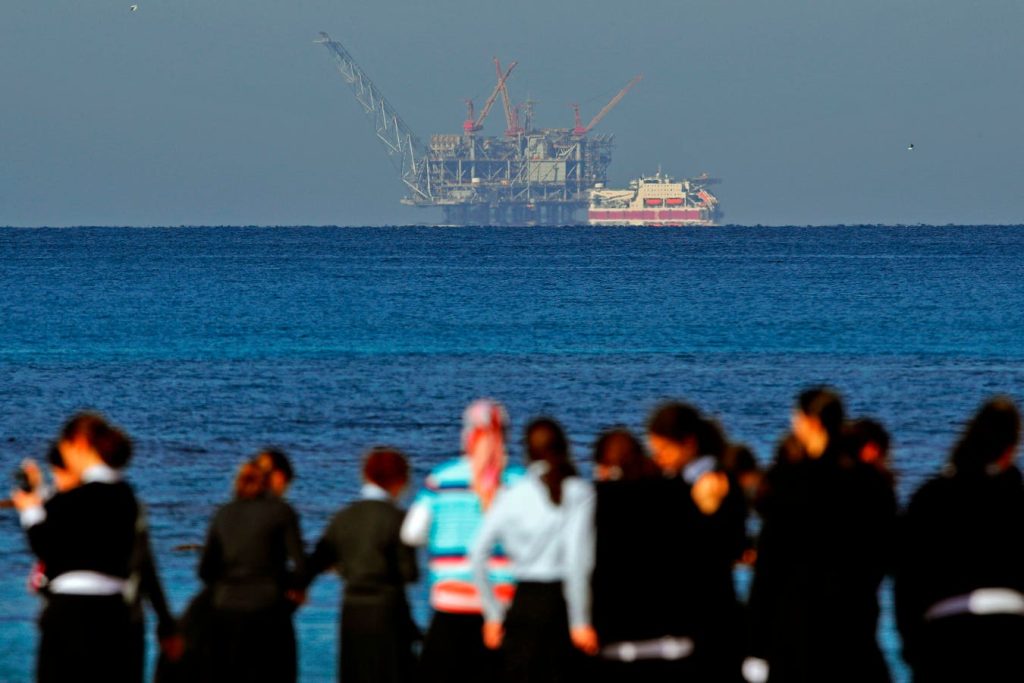A view of the platform of the Leviathan natural gas field in the Mediterranean Sea is pictured from the Israeli northern coastal city of Caesarea on December 19, 2019. – Israel has approved the export of gas from its offshore reserves to Egypt, a spokeswoman said on December 17, with a major reservoir expected to begin operations imminently. The approval by Energy Minister Yuval Steinitz was part of a long process under which Israel will transform from an importer of natural gas from Egypt into an exporter and potential regional energy player. (Photo by JACK GUEZ / AFP) (Photo by JACK GUEZ/AFP via Getty Images)
AFP via Getty Images
Nearly two years after the Hamas massacre of October 7, 2023, and the resulting Gaza war that has further isolated Israel diplomatically, the Jewish State announced the largest export deal in its history.
NewMed Energy, in connection with Leviathan Partners, announced that it signed a $35 billion deal to export natural gas from Israel’s offshore Leviathan natural gas field to Egypt. The off taker will be Blue Ocean Energy, which will import that gas into Egypt until approximately 2040.
The transaction, which will involve the drilling of new wells and the connection of new pipelines to Egypt, deepens the ties between the two nations that border Gaza at a time of extreme stress between them. In fact, the Gaza war has infuriated many in Egypt. But Egypt has so far refused to accept any refugees from Gaza or to allow more aid to flow from Egypt into Gaza.
Regardless of the feelings of many Egyptians, its ruler, General Abdel Fattah Al-Sisi, understands that his country needs energy. The cheapest and easiest place to find it is in the Leviathan Field. As a result, political considerations, like the future of Gaza, give way to the everyday needs of the Egyptian people, who would struggle without a reliable energy supply.
The deal involves the sale of approximately 130 billion cubic meters of natural gas to Egypt over the next 15 years, which is approximately equal to two years of the total supply that Egypt needs. To accomplish this transfer, NewMed will increase its sale of gas to Egypt from 4.5 bcm to 6.5 bcm by early next year, a move that will save Egypt an enormous amount of money.
This deal shows the centrality of energy in Middle Eastern politics, something Lebanese leaders are sure to take note of. Back in 2022, Israel and Lebanon reached an agreement on developing the offshore Karish gas field in Israeli waters and the adjacent Qana gas field in Lebanese waters. While Hezbollah has threatened to torpedo that deal since, and some Israelis have discussed terminating it as well due to Hezbollah’s shelling of northern Israel over the past year, the agreement remains. Now, as Lebanese President Joseph Aoun has been openly discussing disarming Hezbollah, natural gas remains available to Lebanon, a boon to help rebuild its shattered economy.
In short, despite massive political support in the West, Palestinians remain extremely isolated in their home region. Egypt’s move further amplifies how mere rhetorical support for the Gazans only goes so far. As much as Israeli military pressure may eventually wear down Hamas, it may ultimately be Arab economic needs that finally force Hamas to reevaluate its position of seeming to be willing to fight Israel to the bitter end, no matter the cost.


